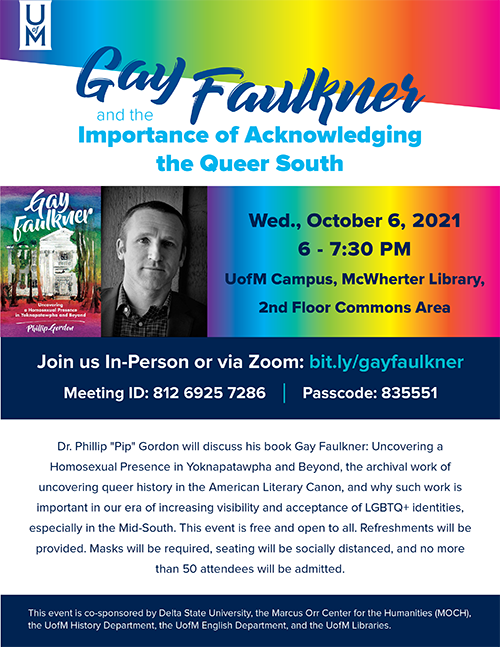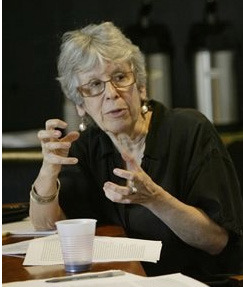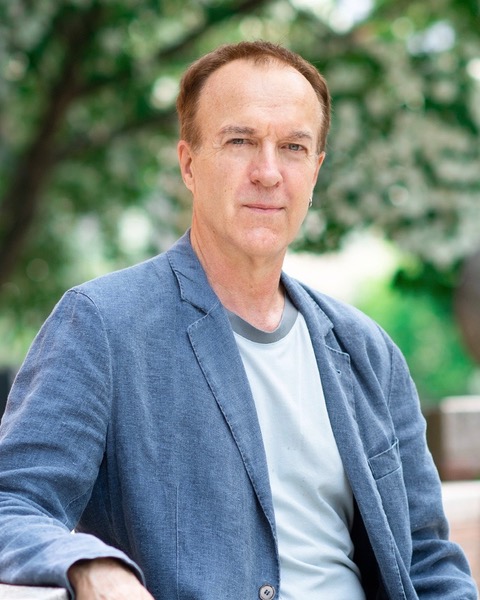Fall 2021 Lecture Series
Please check the details of each event for format. Most events hosted by the Marcus
W. Orr Center for the Humanities will be virtual, available via Zoom and/ Facebook.
Please RSVP to receive full event information and an invitation to the virtual session.
Gay Faulkner and the Importance of Acknowledging the Queer South
Philip Gordon // University of Wisconsin, Platteville
- Wednesday, October 6, 2021
- 6:00-7:30 PM
- This is a hybrid event:
- In-person location: McWherther Library, 2nd Floor
- Click here to join Zoom livestream
- This event is jointly sponsored by McWherther Library, the Department of English,
and
the Marcus W. Orr Center for the Humanities
Dr. Phillip "Pip" Gordon will discuss his recent book Gay Faulkner: Uncovering a Homosexual Presence in Yoknapatawpha and Beyond (University Press of Mississippi, 2019). He'll share the archival work of uncovering queer history in the American Literary Canon as well as why such work is important in our era of increasing visibility and acceptance of LGBTQ+ identities, especially in the Mid-South.
Dr. Gordon is Associate Professor of English and Gay Studies Coordinator at the University of Wisconsin, Platteville.
Backlash: What Is at Stake in the Attacks on Gender and Academic Freedom?
Sesquicentennial Lecture in History
A Virtual Roundtable with Joan Wallach Scott // Institute for Advanced Studies
- Thursday, November 11, 2021
- 6:00-7:30pm
- Live on Zoom and Facebook. Register by clicking here.
- This event is jointly sponsored by the Department of History and the Marcus W. Orr Center for the Humanities.
Recently, French government ministers warned that postcolonial theory is a cover for something called “Islamo-gauchisme.” Meanwhile in the U.S., state legislatures have passed laws banning the teaching of Critical Race Theory. How have the terms and methods of postcolonial theory, gender theory, and critical race theory migrated from graduate seminars and academic conferences to cable news and talk radio? What is driving the visceral and sometimes violent reaction to the critical study of race, gender, sex, and empire? Why are these oft arcane scholarly conversations deemed not just a threat to impressionable students, but to Western civilization itself?
Dr. Joan Wallach Scott (Professor Emerita, Institute for Advanced Study) will join
professors from the University of Memphis for a roundtable discussion about the current
backlash against gender theory, CRT, and other critical traditions in the humanities.
Joan Wallach Scott is Professor Emerita in the School of Social Science at the Institute
for Advanced Study. Her 1986 article “Gender: A Useful Category of Historical Analysis”
has become a classic and is still widely read and regularly taught. A historian of
France as well as of gender, sexuality and women’s history, she is also known for
her work in Feminist Theory. Her most recent books are Knowledge, Power, and Academic
Freedom and On The Judgment of History.
Slow Violence and Environmental Justice in 2021
Rob Nixon // Princeton University
Naseeb Shaheen Memorial Lecture
- Thursday, November 18, 2021
- 6:00-7:30 PM
- Live on Zoom and Facebook: Register by clicking here.
- This event is jointly sponsored by the Department of English and the Marcus W. Orr Center for the Humanities.
How does the campaign for environmental justice inform the most urgent issues of our time? Nixon will look, in particular, at Black Lives Matter, the Climate Crisis, and the COVID-19 pandemic. What can we learn about the crossover concerns that connect them? How have artists sought to bring life and energy to these struggles for justice? And how does slow violence manifest in these social movements?
Rob Nixon holds the Barron Family Professorship in Environment and Humanities at Princeton University. He is the author most recently of Slow Violence and the Environmentalism of the Poor. He writes frequently for the New York Times and his essays have appeared in The New Yorker, The Atlantic, The Guardian, The Nation, London Review of Books, The Village Voice, Aeon, Boston Review, and elsewhere. For the past twenty-five years, his writing and teaching have focused on environmental justice struggles in the global South. He has a particular passion for trying to understand the roles that artists can play in helping catalyze social change.



